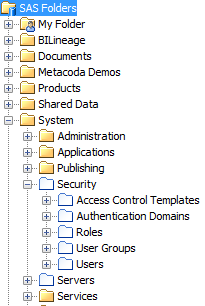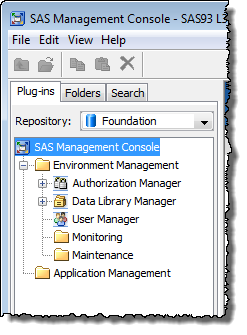Did you know that with SAS® 9.3 you can promote (export/import) SAS metadata packages containing users, groups, roles, and ACTs, just like you can with Jobs, Tables, Libraries, Stored Processes, Reports and Information Maps? I needed to do this myself a few weeks ago. I wanted to promote some groups, roles and ACTs from an existing SAS 9.3 M1 installation to a newer SAS 9.3 M2 installation. Security metadata can be exported and imported via a SAS package file (.spk) from special virtual folders under the top-level /System folder. These virtual folders are distinguishable from normal folders because they have white folder icons instead of yellow folder icons as shown below.

You can find out more information about this feature, including a few considerations you need to be aware of, by reading the Promoting Security Objects and Server Objects sub-section of the main Promotion Details for Specific Object Types section in the SAS 9.3 Intelligence Platform: System Administration Guide, Second Edition.
My security metadata promotion was a little more complicated than normal because I was also promoting some security metadata located in a custom repository. I normally avoid using custom repositories as much as possible (preferring to store everything in the Foundation repository and partitioning content with folders and ACTs). This is especially the case for security metadata: I’ve found that security metadata in custom repositories, being less visible, tends to get forgotten until it gets rediscovered whilst troubleshooting tricky security problems. Helping a customer resolve such problems was the reason we made security metadata from custom repositories highly visible in our Metacoda Security Plug-ins. We have since needed to keep some security metadata in custom repositories for the purposes of development and testing of our software. This is the custom repository security metadata I was attempting to promote, but it took me a little while to find it in the virtual folders …. Continue reading “Promoting SAS Security Metadata (in Custom Repositories)”

